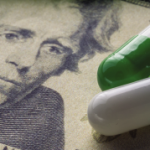Pfizer and AstraZeneca executives said in recent interviews with Reuters that they are monitoring the effect of these programs.
“The impact on our business is relatively limited, but it is a concern,” said Ruud Dobber, who heads Britain-based AstraZeneca’s U.S. commercial operations.
AbbVie, maker of top-selling arthritis treatment Humira, said in April it expects moderately higher spending on copay assistance this year.
Bypassing the Copay
More than 170 million Americans have health coverage through their employers and pay some portion of their prescription drug costs, amounting to up to thousands of dollars a year in copayments. Employers say that keeps workers aware of the rising cost of medicines and more likely to accept cheaper alternatives, where possible.
Drugmakers have tried to bypass that requirement to keep patients using their medicines. They offer discount cards that keep the patient’s payment low, say at $25, when they fill a prescription. The drugmaker pays the remainder required by the health plan, thwarting employers’ intentions.
Pharmaceutical industry spending on copay cards has more than doubled to $7 billion over the past five years, mostly due to coupons offered on higher-cost specialty drugs, according to consultancy ZS Associates.
The programs at Express Scripts and CVS, which manage prescription drug benefits for employers, change how this works.
A copay “accumulator” recognizes when an employee uses a drugmaker discount card and makes sure that money does not apply toward their annual out-of-pocket spending requirement.
When the copay card runs out of money, a patient must either cover the full copay cost, get a new discount card, or stop filling the prescription. The program can apply to almost any drug coupon used at a pharmacy working with the pharmacy benefit manager.
A copay “maximizer” is more limited in scope, but potentially as costly to the drugmaker. They apply only to a short list of drugs that employees purchase from specialty pharmacies run by Express Scripts and CVS.
In maximizer programs some benefit managers, including Express Scripts, make sure patients sign up to receive copay cards from the manufacturers. They then raise the patient’s required copayment to tap the discount cards for the maximum amount set by a drugmaker, which can be more than $10,000 annually for pricey drugs.
New Jersey-based pharma and managed care consultancy Zitter Health Insights estimates that there are more than 41 million Americans in plans that use an accumulator and 9 million in plans with the maximizer approach. It is not clear how much overlap there is between the two as some employers use both.


